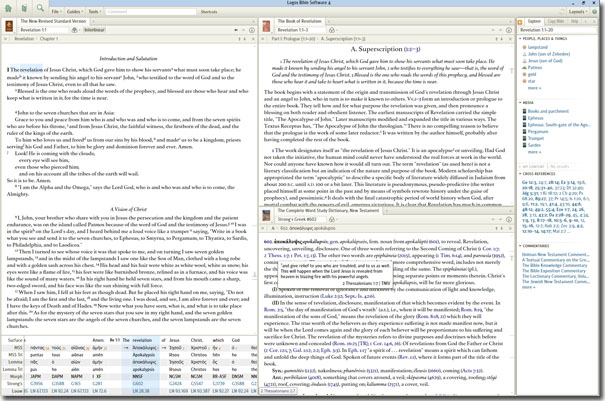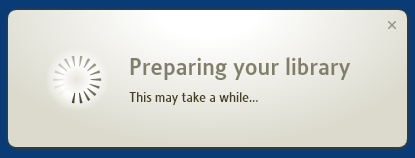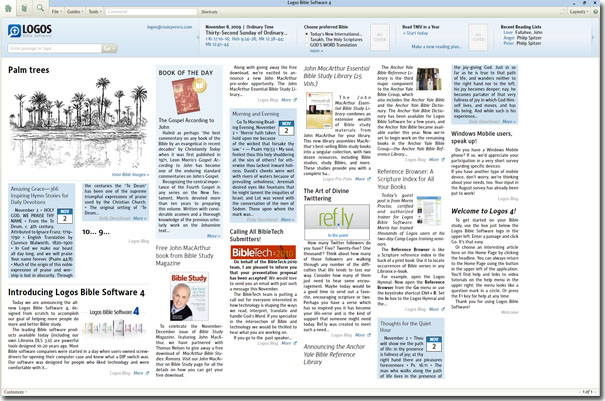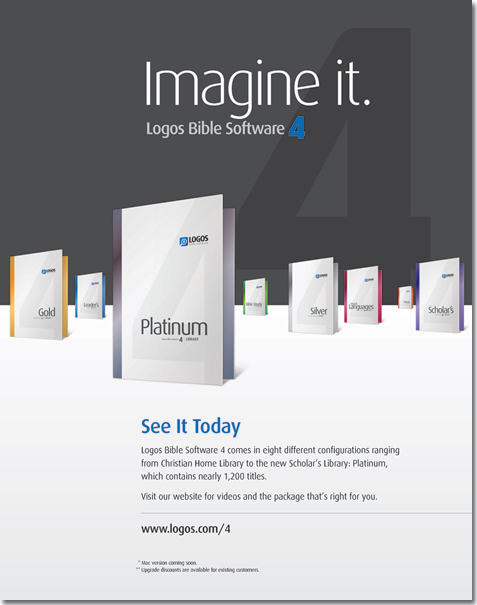HuffPost’s new Religion section leads off with an article on Faith and Technology
By Rosie Perera | February 24, 2010 at 9:09 pm
The Huffington Post, recognizing what a vital role religion plays in culture, politics, and life, has launched a Religion section today. One of the inaugural articles is “Finding the Spirituality in New Media” by Steven Barrie-Anthony, a Ph.D. student in Religious Studies at UC Santa Barbara, and former features writer for the LA Times, where he focused on technology and arts/culture.
Topics: Uncategorized | No Comments »
Logos 4 Video Tutorial: Hebrew Bible Word Study for Beginners with no Hebrew knowledge
By Rosie Perera | January 12, 2010 at 3:50 am
I’m going to begin posting here any significant Logos 4 video tutorials I make. The first one is Hebrew Bible Word Study for Beginners with no Hebrew knowledge.
Topics: Logos 4 Video Tutorials | No Comments »
Whither Democracy 2.0?
By Rosie Perera | December 4, 2009 at 11:17 am
My latest technology column for Comment Magazine has been published: Whither Democracy 2.0?
Topics: Uncategorized | No Comments »
Retweeting for AIDS research
By Rosie Perera | December 1, 2009 at 10:43 pm
So, yet again my mixed feelings about Twitter get tweaked. An old friend of mine from Microsoft has hit the headlines in Seattle’s TechFlash, and raised over $7,500 for AIDS research merely by sending out one tweet. It said “For each re-tweet, I’ll donate $5 to fight AIDS.” It started as just a twexperiment (Twitter-speak for “Twitter experiment”). The tweet went viral, and within a few hours Mike had to adjust his original budget of $500 and cap the offer at $10,000.

I’m wondering, though: did Twitter actually accomplish anything towards raising funds for AIDS research? Couldn’t Mike have simply donated $10,000 without involving 2000 people retweeting his tweet? Isn’t he just encouraging people to think they can accomplish good for the world by sitting there twittering? Is rewarding this kind of “armchair activism” good for the world in the long run? Well, maybe the fact that his twexperiment became newsworthy is the answer. It bumped up people’s awareness of World AIDS Day, and perhaps for that reason we should thank Twitter. (Still, does your awareness that today is World AIDS Day make you do anything about it? It didn’t make me do anything about it other than “retweeting” this story about Mike’s twexperiment. Do you really believe that if we all chatter more about AIDS it will make it go away?)
Topics: Uncategorized | No Comments »
Twitter ads
By Rosie Perera | November 24, 2009 at 8:57 pm
I knew it wouldn’t be long before this happened: “[Advertisers] are offering to pay Twitterers to gain access to their followers — so they can send them tweets containing ads. The more followers you have, the more money you make.” If I were ever tempted to get on Twitter before, this turns me off completely. No thanks, I won’t follow people and get spammed by their advertising associates just so those people can make money off of me. As with public radio before, now we’ll need a new class of non-commercial Twitter accounts.
Topics: Uncategorized | No Comments »
Introducing Logos 4: Bible Study Reimagined
By Rosie Perera | November 2, 2009 at 11:02 pm
Today Logos Bible Software unveiled the latest version of their flagship product. Logos is more than just a Bible study system, it is an entire digital theological library, with intelligent cross-referencing between the books, powerful search capabilities, amazing automated study tools, and a whole lot more. In keeping with the way the company tends to do major upgrades, Logos 4 is a complete rewrite from the ground up, with a whole new user interface, new ways of doing things which should be easier to grasp, and a bunch of new features and resources.
As someone who used to work in software development and has had the experience of working on both complete rewrites and incremental changes to legacy code, I know there are benefits and pitfalls to each. The advantages of the former are a clean slate and the ability to break away from limitations in the underlying design. One downside is that you are starting over from scratch so you have to either re-implement all the features (which can take a long time), or leave part of the functionality for a later version. The developers necessarily had to omit a few features in order to get Logos 4 out the door, but they will be adding them back in as time goes on. Another disadvantage is that you lose all the years of bug-fixing and have a whole new set of potential bugs to work out (look for Service Releases to follow closely on the heels of Logos 4). However, they did a very intensive beta test with lots of dedicated and involved users, so hopefully they’ve banged out most of the bugs by now. We beta testers are already on SR2, as a few glitches were found after the DVD was released to manufacturing; you’ll get the fixes automatically once you install. One last disadvantage to rewriting from scratch and completely overhauling the user interface is that your existing user base might be frustrated at having to learn a new UI. But the idea is that if you design it well enough, they will soon grow to like it better than the old one. The jury is still out for me, since I’ve only been using it for the past two weeks.
The first big difference you’ll notice after installation is that you need to log in to your Logos account in order to access your resources. Once you’ve downloaded them all you can run Logos offline, but that initial sync and indexing can take quite a while, depending on how many books are in your library. Best to install when you’re just about to go to bed and leave it running overnight. Mine took a couple of hours.
When you start up Logos 4 for the first time you see the new home page:
Here you can select your preferred default Bible version, check for any news from Logos, read your daily devotions, etc. At first I was somewhat taken aback by having Logos’s blog be the default startup view, and I turned it off right away (you can control all of what shows up in your home page, or whether it even shows up at all). It’s not so jarring anymore, but I still prefer to get straight to my Bible text.
The next thing you’ll notice is a completely new (and much simpler) navigation and menu system.
My techie brain says “over-simplified; can’t find how to do what I want to do anymore,” but again, as with any new version, you get used to it. And I’m sure that for new users, it will be much more intuitive and less frustrating than the old user interface. I simply haven’t been using it long enough to not miss the old UI somewhat. Fortunately, you can have both versions running side-by-side if you aren’t quite ready to go whole hog with the new one. And because not all of the features are ported over to the new version yet, I will be using Logos 3 for some time.
Some of what is missing is missing because you don’t need to do it anymore. All of that complexity about unlocking books and keeping your licenses in sync is gone. When you buy a new resource from Logos.com, it’s simply there when you start your software, automatically integrated into your existing library. And once you’ve purchased any book, you will automatically get any future updates if it is ever revised in the future. In version 3, you used to have to consciously update the software periodically, and backup and restore your licenses when installing onto a new computer. It was all a pain and confused people. I personally like having some control over when my software updates itself, so I’m not sure how I’ll take to this new reality, but I think the majority of users just don’t want to think about it and will be glad that these chores are automated now.
Every time you purchase new books or receive new versions of existing ones, the index will have to be rebuilt, though it is supposed to go more quickly after the first time. I have yet to figure out when/why indexing happens afresh, and why it sometimes appears to take exceedingly long (e.g., just a few minutes ago I chose to “Restart Logos” and it’s now re-indexing; it says there are over 16 hours remaining, but that time calculation keeps going up not down….oops, I just closed a bunch of applications and freed up more memory and the time remaining went down to 5 hours, so I guess it means the more memory you have available the faster it will be). If indexing is taking too long, you can still do work. You can pause the indexing for four hours and come back to it later. Some resources might not be accessible in the meantime, but you should still be able to do most things.
That’s enough for now. I plan to write about some of the new features and new ways of doing old things in future posts. I’ve got to figure out more of it myself first. If you can’t wait…click the ad below to go to the Logos website where you can find out more and order Logos 4.
Here is a the official Logos PDFdocument that gives more details about the new version: Bible Study Reimagined (it’s 16 MB). Also, here are some other beta testers who have reviewed it: Chris Roberts, Timothy Lovegrove, Mike Aubrey, J.R. Miller, Ken Morris, Darryl Burling, “Thomas,” and Adam Couturier. Thomas Black gives a good illustrated run-through of the setup process and first run experience. Rick Brannan (a Logos employee) gives an insider’s look at the product.
Full disclosure: As a beta tester, I received a free upgrade to the new base package for Logos 4 which includes more books than my previous library contained, and for agreeing to blog about it on release day, I was given a heads-up about when the release date would be a week in advance. Also, I am a shareholder in the company.
Topics: Uncategorized | No Comments »
Social networking and faith identity
By Rosie Perera | October 9, 2009 at 9:36 pm
My latest column for Comment magazine is online now: Social networking and faith identity
Topics: Uncategorized | No Comments »
A Structural Demythologizing of Facebook
By Rosie Perera | October 9, 2009 at 9:05 pm
Sorina Higgins wrote a wonderful essay on Facebook for her literary theory class and posted it on her blog and (ironically) on Facebook. She writes about how Facebook has its own mythological language in which it perpetuates fictions, but some of its fictions spill over into the physical world and become reality. The article ends with this intriguingly provocative summary: “In essence, Facebook is a tool for suppressing revolution. It keeps the middle class from rising by convincing them that they are more important than they are. What feels like free speech and the freedom of assembly is actually a form of class repression: keeping us in our sphere by giving us a little room in which to shout and prance. We fancy we can make a difference. All we can really do is waste time.”
The full article can be found here.
While I agree with much of her analysis, I disagree when she says that we can’t make a difference on Facebook. Armchair activism is notoriously ineffective in the old technology of email chain letters and e-petitions. However because of the power of Facebook’s myth to spill over into reality, people really are donating real funds to real causes and volunteering their offline time for real social justice because of Facebook and Twitter. This article about the outpouring of love and tangible help in the wake of the recent Phillipine disaster, unexpected in a “culture of apathy,” corroborates this trend: Volunteerism in the age of Facebook, Twitter. Another success story is the microlending website Kiva, which I first found out about through social networking.
Topics: Uncategorized | No Comments »
How to Deal with Technology Overload
By Rosie Perera | October 8, 2009 at 6:10 pm
PBS MediaShift’s 5Across videocast (October 2009 episode) presents a discussion between Leif Hanson (a Regent alum friend of mine, founder of Spark Interaction, and presenter of SoulTech workshops), Dom Sagolla (one of the creators of Twitter), other technology/media experts and a psychologist. Great stuff.
Credits and guest bios can be found here.
Topics: Uncategorized | No Comments »
CBC Archives: Internet – a “modulated anarchy” (1993)
By Rosie Perera | September 19, 2009 at 9:36 pm
Here’s a fascinating and quaint look at the Internet back in 1993, when it was a bit more civil. CBC interviews playwright and Internet enthusiast John Allen. Some choice quotes:
“It feels a bit like everyday human fellowship, but it’s bigger and more precise.”
As if “everyday human fellowship” needed improving upon? The imprecision is part of what makes it so wonderfully human. The interesting thing is that the Internet has pretty much become our major medium for “everyday human fellowship.” Is it really any more “precise” than face-to-face communication? I think the reality is the other way around. Because of missing cues (tone of voice and body language), online communication is less clear. Maybe in a sense it is more precise, because words mean exactly what they mean, but perhaps not necessarily what they were intended to mean. You need the imprecision of person-to-person conversation to avoid unintentionally offending someone.
“There’s an interesting kind of restraint that you find. I mean there’s not a lot of cursing or swearing….there’s not a lot of put-downs…there’s not screenfuls of ‘Go to hell!'”
WTF? Things sure have changed in 16 years! I wonder if that’s more a factor of society in general changing or people getting more used to the medium. The anarchy is not so modulated anymore, eh?
Topics: Uncategorized | No Comments »
« Previous Entries Next Entries »





